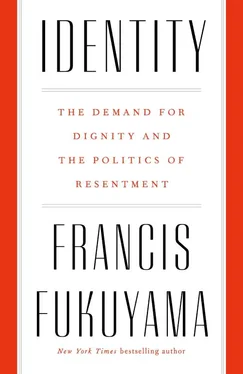The connection between economic interest and recognition was well understood by the founder of modern political economy, Adam Smith, in his book The Theory of Moral Sentiments . Even in late-eighteenth-century Britain, he observed that the poor had basic necessities and did not suffer from gross material deprivation. They sought wealth for a different reason:
To be observed, to be attended to, to be taken notice of with sympathy, complacency, and approbation, are all the advantages which we can propose to derive from it. It is the vanity, not the ease or the pleasure, which interests us. But vanity is always founded upon the belief of our being the object of attention and approbation.
The rich man glories in his riches, because he feels that they naturally draw upon him the attention of the world, and that mankind are disposed to go along with him in all the agreeable emotions with which the advantages of his situation so readily inspire him… The poor man, on the contrary, is ashamed of his poverty. He feels that it either places him out of sight of mankind, or, that if they take any notice of him, they have, however, scarce any fellow-feeling with the misery and distress which he suffers. {1} 1 Adam Smith, The Theory of Moral Sentiments (Indianapolis: Liberty Classics, 1982), 50–51.
The rich man “glories in his riches.” If one thinks about the class of global billionaires and asks what gets them out of bed every morning, the answer cannot be that they feel the lack of some necessity but cannot have it if they do not make another $100 million in the coming months. One can only have so many houses, boats, and airplanes before one loses count. Rather, they want other things: to have the biggest collection of Francis Bacon paintings, or to skipper the winning America’s Cup yacht, or to build the largest charitable foundation. What they seek is not some absolute level of wealth, but rather status relative to that of other billionaires.
Something similar can be said of poverty in a wealthy country such as the United States, Germany, or Sweden. As conservatives never tire of pointing out, people living below the poverty line in the United States enjoy a remarkable level of material wealth, far higher than that of a poor person in sub-Saharan Africa: they own televisions, automobiles, and Air Jordans; they tend to suffer not from malnutrition but from obesity because they eat too much junk food.
There is of course material deprivation in the United States, in the lack of access to good education or health care. But the pain of poverty is felt more often as a loss of dignity: as Smith notes, the poor man’s situation “places him out of sight of mankind,” such that they have no fellow feeling for him. This was the basic insight of Ralph Ellison’s classic novel, Invisible Man , about a black man moving from the American South to Harlem. The real indignity of racism in the North was that African-Americans were invisible to their white peers, not necessarily mistreated but simply not seen as fellow human beings. Consider that the next time you give money to a homeless person, but fail to make eye contact with him or her: you are relieving the material want, but failing to acknowledge the shared humanity between the beggar and you.
The connection of income to dignity also suggests why something like a universal guaranteed income as a solution to job loss from automation won’t buy social peace or make people happy. Having a job conveys not just resources, but recognition by the rest of society that one is doing something socially valuable. Someone paid for doing nothing has no basis for pride.
The economist Robert Frank notes the connection between wealth and status and points out that the latter is often desired not for its absolute but for its relative value. He calls this a “positional good”: I want that Tesla not because I care so much about global warming, but because it is trendy and expensive, and my neighbor is still driving a BMW. Human happiness is oftentimes more strongly connected to our relative than to our absolute status. Frank points out that in surveys, people with higher incomes report higher degrees of happiness. One might think this is related to absolute levels of income, except that people with comparable relative status report comparable levels of happiness regardless of their absolute wealth: upper-income Nigerians are just as happy as their German counterparts, despite the economic gap separating them. One compares oneself not globally to some absolute standard of wealth, but relative to a local group that one deals with socially. {2} 2 Frank, Choosing the Right Pond , 26–30.
A great deal of evidence coming out of the natural sciences suggests that the desire for status—megalothymia—is rooted in human biology. Primates that achieve dominance or alpha male status within their local hierarchies have been widely observed as having higher levels of the neurotransmitter serotonin. Serotonin is associated with feelings of well-being and elation in human beings; that is why selective serotonin reuptake inhibitors such as Prozac and Zoloft are widely used in treating depression and low self-esteem. {3} 3 Ibid., 21–26. See also Francis Fukuyama, Our Posthuman Future: Consequences of the Biotechnology Revolution (New York: Farrar, Straus and Giroux, 2001), 41–56.
A further psychological fact suggests that certain things in contemporary politics are related more to status than to resources. One of the clear findings from experimental behavioral economics is that people are much more sensitive to losses than to gains. That is, they are likely to spend much more effort to avoid the loss of $100 than to receive an extra $100 in income. {4} 4 Kahneman, Thinking, Fast and Slow , 283–85.
This may explain a historical phenomenon noted by Samuel Huntington, namely that the most politically destabilizing group tends not to be the desperate poor, but rather middle classes who feel they are losing their status with respect to other groups. He cites Alexis de Tocqueville, who noted that the French Revolution was not triggered by indigent peasants, but by a rising middle class that suddenly saw its economic and political prospects sink in the decade before the Revolution. The poor tend to be politically disorganized and preoccupied with day-to-day survival. People who think of themselves as middle class, by contrast, have more time for political activity and are better educated and easier to mobilize. More important, they feel that their economic status entitles them to respect: they work hard at jobs that are useful to society, they raise families, and they carry out their responsibilities to society such as paying taxes. They know that they are not at the top of the economic heap, but they also have pride in not being indigent or dependent on government help to survive. [3] In the United States there is a great deal of confusion over the term middle class , since a large majority of Americans like to categorize themselves as middle class, even when they are well-to-do elites or people who in Europe would be characterized as working-class or even poor. The most politically relevant group would be those in the third or fourth quintiles of the national income distribution, who are the most vulnerable to stagnation or downward mobility.
Middle-class people do not feel themselves to be at the margins of society; rather, they typically feel that they constitute the core of national identity.
Loss of middle-class status may explain one of the most bitter polarizations in contemporary politics, which has emerged in Thailand. The country has been riven by an intense polarization between “yellow shirts” and “red shirts,” the former upper-class supporters of the monarchy and military and the latter supporters of the Thai Rak Thai party, led by Thaksin Shinawatra. This conflict, which closed down much of Bangkok in 2010 and resulted in a yellow-shirt-supported military coup, has alternatively been seen as a fight over ideology based on the redistribution programs that Thaksin and his sister Yingluck, prime minister from 2011 to 2014, provided to rural Thais, or else a fight about corruption. Federico Ferrara argues, however, that it is better seen as a fight over recognition. Traditional Thai society had been rigidly stratified based on perceived “Thai-ness,” the geographical and ethnolinguistic distance of people from the elite in Bangkok. Decades of economic growth had raised up many of Thaksin’s voters, who began to assert their provincial identities in ways that enraged the Bangkok elite. It was often middle-class Thais who became the most politically engaged, and that explains why an apparently economic conflict became a zero-sum game driven by thymos. {5} 5 Federico Ferrara, “The Psychology of Thailand’s Domestic Political Conflict: Democracy, Social Identity, and the ‘Struggle for Recognition’” (manuscript presented at the international workshop “Coup, King, Crisis: Thailand’s Political Troubles and the Royal Succession,” Shorenstein Asia-Pacific Research Center, Stanford University, January 24–25, 2017).
Читать дальше












